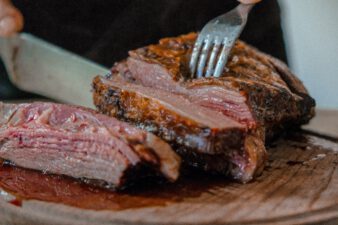Israel has an uneven contribution to the cultivated meat market. This means growing real meat with live cells, but circumventing animal suffering. It’s meat in a lab, if you will. Impossible Burgers is “meat” made from pea protein that just tastes like a whole lot of coconut oil. Cultivated meat is the real thing but made in a lab. No animals need to be slaughtered for lab meat. In Israel think Aleph Farms, Steakholder Foods,Super Meat, Believer Meats, and now BioBetter.
BioBetter just sent Green Prophet an announcement that it has opened its food-grade pilot facility to grow raw materials for the expanding cultivated meat market. The company has pioneered a unique protein manufacturing platform using tobacco plants as self-sustained, animal-free bioreactors.
They tell Green Prophet: “BioBetter is going to market raw materials, the growth factors, ingredients that are needed in the cultivated meat production process. We are not making bioreactors. Also, we are not making actual meat, we produce growth factors in tobacco plants that function like bioreactors for the cultivated meat industry.”
Currently cultivated meat production processes are relatively expensive, making it a challenge to scale up and reach price parity with animal-based counterparts: “Cultivated meat is still very expensive in comparison to conventional meat and the key is to reduce the growth medium costs to a minimum,” explains Amit Yaari, the CEO of BioBetter.
Companies like Israel’s Aleph Farms have introduced small steaks but the cost is hundreds to thousands of dollars to produce meat in a lab. BioBetter could help Aleph Farms make steaks faster and at less cost.

BioBetter makes raw materials for the cultivated meat market“Our target is to reduce the production cost of growth factors, including insulin, a key part of the growth
medium, to $1 per gram which is a 100-fold less than the going rate today,” notes Yaari.
BioBetter has achieved five impressive milestones in just the past year:
1. Production scale-up/building pilot plan
2. Commercial scale cultivation of insulin- and FGF-expressing tobacco plants
3. Reaching GF expression levels that enable a significant reduction of production costs
4. Significant regulatory progresses and advances with the Israel Ministry of Health
5. Collaboration with leading cultivated meat companies
BioBetter’s technology is a new purpose for the traditionally shunned tobacco plants, transforming them
into bioreactors for the production of growth factors for meat. Tobacco plants are typically used to make vaccines.
Growth factors for cell growth play a key role in the proliferation and differentiation of cultured meat cells, allowing for the formation of authentic and well-structured muscle tissue. Designed for both environmental safety and efficiency, these bioreactors will be grown in a large- scale, net house cultivation system. The plants are carefully engineered to prevent the escape of any transgenic material.
They are induced to express growth factors only when chemically triggered, and the company exclusively uses non-food, non-feed tobacco plants to eliminate any risk of inadvertent consumption or cross-contamination of food crops.
Sustainability at the core?

Tobacco plants produce growth hormones for molecular farms or cultivated meat
While the science talk may inspire the common sense sustainability folk to just return to actual farming or hunting, “Our commitment to sustainability shines through in every facet of our operations,” says Yaari. “We plan to use recycled and low-quality water for irrigation, minimize nitrogen fertilizer use, and reduce emissions and environmental impact.
The newly established pilot plant has the capacity to process 100kg of tobacco plant-derived GFs
daily. Constructed in adherence to the highest quality standards, the facility meets all regulatory
requirements for production of food-grade growth factors, including FGF2 and insulin. It currently is
progressing through essential stages of securing approval from the Ministry of Health for food
manufacturing licensing. The company is committed to scalability, adhering to ISO2200 and HACCP
standards.

Meat proteins are grown with the help of tobacco plants
BioBetter also made breakthroughs in the cultivation of bovine insulin-expressing plants. Several
thousand square meters of FGF2-expressing tobacco plants are already thriving in northern Israel.
It’s the first time growth factor sources have been successfully planted in large net-houses, in four
locations, and with a fruitful harvest obtained in its first season.
Plans are underway to cultivate more FGF2 and insulin-expressing plants, with commercial roll-out projected for 2024.
The 250 million USD global cultivated meat sector is poised for substantial growth, yet its realization hinges upon a significant supply of growth factors. The most significant challenge of the cultivated meat industry is to produce and scale up at the right cost,” notes Aviv Oren, Director of Business Engagement and Innovation, the Good Food
Institute, Israel. “BioBetter’s technology, which is based on molecular farming of food-grade growth
factors in the required quantities and costs for industrial production, is a pivotal addition that has
the potential to accelerate this industry.”
In 2022, BioBetter secured 10 million USD in an A-round investment led by Jerusalem Venture
Partners (JVP). The company also is an active member of the Israeli Cultivated Meat Consortium,
which unites academic institutions, large companies, and start-ups to collaboratively advance the
field of cultivated meat.
Interested in this market? We have created an overview on molecular farming in Israel.






